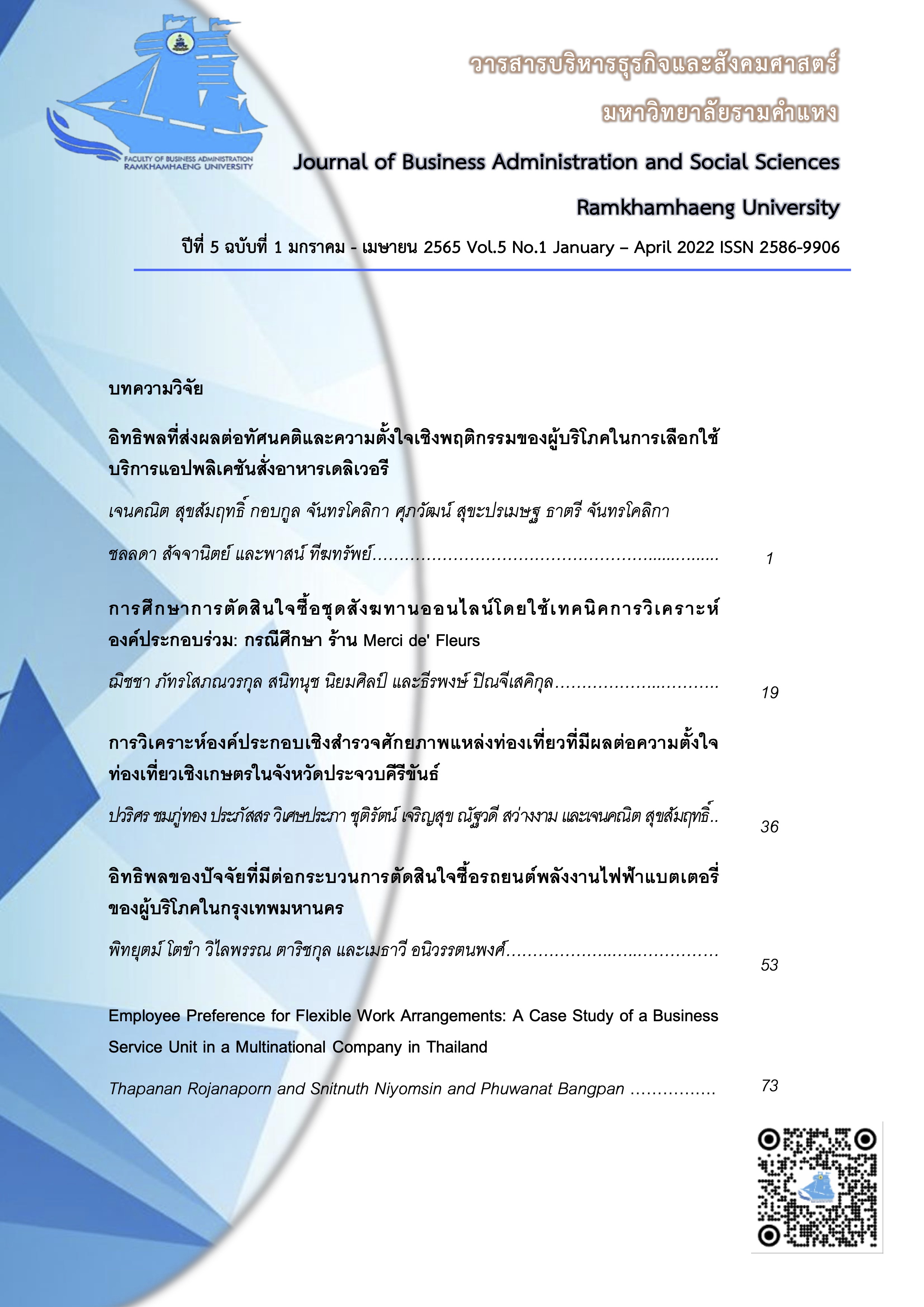The Influence of Factors on Purchasing Decision Process for Battery Electric Vehicles of Consumers in Bangkok Metropolis
Main Article Content
Abstract
In this research investigation, the researchers examine 1) the purchasing decision process for battery electric vehicles (BEVs) classified by personal factors; and investigate 2) the influence of factors on the purchasing decision process for BEVs. The sample population consisted of 384 consumers in Bangkok Metropolis who decided to purchase BEVs. The method of quota sampling was employed. The research instrument was a questionnaire. Data were analyzed using mean and standard deviation. The techniques of t test, one-way analysis of variance (ANOVA), and multiple regression analysis were also used.
Findings showed that the consumers under study exhibited levels of opinions regarding marketing mix factors in the aspect of place; content marketing factors in the aspect of content presentation; technology acceptance factors in the aspect of utilization perception; and purchasing decision process for BEVs in the aspect of seeking information at the highest level. Differences in gender, age, and average monthly income exhibited differences in the purchasing decision process for BEVs. The factor of marketing promotion positively influenced the purchasing decision process of consumers for BEVs at the highest level. Next in descending order were place, product, price, attitudes towards product usage, and the perceived ease of use. However, the factor of price exhibited a negative influence on the purchasing decision process of consumers for BEVs.
Article Details

This work is licensed under a Creative Commons Attribution-NonCommercial-NoDerivatives 4.0 International License.
เนื้อหาและข้อมูลในบทความที่ลงตีพิมพ์ในวารสารบริหารธุรกิจและสังคมศาสตร์ มหาวิทยาลัยรามคำแหง ถือเป็นข้อคิดเห็นและความรับผิดชอบของผู้เขียนบทความโดยตรง ซึ่งกองบรรณาธิการไม่จำเป็นต้องเห็นด้วย หรือร่วมรับผิดชอบใดๆ
บทความ ข้อมูล เนื้อหา รูปภาพ ฯลฯ ที่ได้รับการตีพิมพ์ในวารสารบริหารธุรกิจและสังคมศาสตร์ มหาวิทยาลัยรามคำแหง ถือเป็นลิขสิทธิ์ของวารสารบริหารธุรกิจและสังคมศาสตร์ มหาวิทยาลัยรามคำแหง หากบุคคลหรือหน่วยงานใดต้องการนำบทความทั้งหมดหรือส่วนหนึ่งส่วนใดไปเผยแพร่ต่อ หรือเพื่อกระทำการใดๆ จะต้องได้รับอนุญาตเป็นลายลักษณ์อักษรจากวารสารบริหารธุรกิจและสังคมศาสตร์ มหาวิทยาลัยรามคำแหง ก่อนเท่านั้น
References
กฤษฎา เสกตระกูล. (2564, พฤษภาคม 10). ธุรกิจกับการแก้ปัญหาโลกร้อน (ตอนที่ 4). สืบค้น
จาก https://www.set.or.th/set/enterprise/article/detail.do?contentId=7765&type=article
กัญจน์นิกข์ กำเนิดเพ็ชร์. (2563). ปัจจัยที่มีอิทธิพลต่อการตัดสินใจซื้อรถยนต์ไฟฟ้าแบบแบตเตอรี่ของผู้บริโภคในเขตกรุงเทพมหานครและปริมณฑล. วารสารการวิจัยเพื่อพัฒนาชุมชน (มนุษยศาสตร์และสังคมศาสตร์), 13(3), 82-95.
กัลยา วานิชย์บัญชา. (2555). การใช้ SPSS for windows ในการวิเคราะห์ข้อมูล (พิมพ์ครั้งที่ 20). กรุงเทพมหานคร: สำนักพิมพ์จุฬาลงกรณ์มหาวิทยาลัย.
จารุพันธ์ ยาชมภู. (2559). ปัจจัยที่ส่งผลต่อการตัดสินใจเลือกซื้อรถยนต์ขนาดไม่เกิน 1,500 ซีซี. การค้นคว้าอิสระบริหารธุรกิจมหาบัณฑิต, มหาวิทยาลัยธรรมศาสตร์.
เดชา เดชะวัฒนไพศาล, กฤษยา นุ่มพยา, จีราภา นวลลักษณ์ และชนพัฒน์ ปลื้มบุญ. (2557). การศึกษาเจนเนอเรชั่นเอ็กซ์และเจนเนอเรชั่นวายในมุมมองต่อคุณลักษณะของตนเองและความคาดหวังต่อคุณลักษณะของเจนเนอเรชั่นอื่น. จุฬาลงกรณ์ธุรกิจปริทัศน์, 36(3), 1-17.
ทิฆัมพร ทวีเดช และสมบัติ ทีฆทรัพย์. (2563). ปัจจัยทางการตลาดที่มีอิทธิพลต่อการตัดสินใจซื้อรถยนต์ไฟฟ้าแบตเตอรี่ของผู้อาศัยในจังหวัดปราจีณบุรีด้วยการวิเคราะห์ถดถอยพหุคูณแบบขั้นตอน. วารสารสารสนเทศ, 19(1), 57-70.
บุญมี พันธุ์ไทย. (2557). ระเบียบวิธีวิจัยการศึกษาเบื้องต้น (พิมพ์ครั้งที่ 3). กรุงเทพมหานคร: สำนักพิมพ์มหาวิทยาลัยรามคำแหง.
บุษยา วงษ์ชวลิตกุล, สงวน วงษ์ชวลิตกุล, ธนกร ลิ้มศรัณย์, อรอุมา ปราชญ์ปรีชา, ทศพล ปราชญ์ปรีชา และจอมภัค จันทะคัต. (2560). พฤติกรรมการซื้อและการวิเคราะห์องค์ประกอบปัจจัยที่มีผลต่อการซื้อสินค้าหรือบริการผ่านระบบพาณิชย์อิเล็กทรอนิกส์ของผู้บริโภคในเขตเทศบาลนครราชสีมา
จังหวัดนครราชสีมา. วารสารวิชาการบริหารธุรกิจ สมาคมสถาบันอุดมศึกษาเอกชนแห่งประเทศไทย, 6(1), 95-113.
วรเทพ เจิมจุติธรรม. (2557). ปัจจัยส่วนประสมทางการตลาดที่ส่งผลต่อการตัดสินใจซื้อรถยนต์ไฮบริด กรณีศึกษา Toyota Prius. การค้นคว้าอิสระบริหารธุรกิจมหาบัณฑิต, มหาวิทยาลัยเนชั่น.
สถาบันยานยนต์. (2564). ความรู้ยานยนต์ไฟฟ้าเบื้องต้น. สืบค้นจาก https://www.thaiauto.or.th/2012/th/services/ev/pdf/ev-Intro.pdf
สิงหะ ฉวีสุข และสุนันทา วงศ์จตุรภัทร. (2555). ทฤษฎีการยอมรับการใช้เทคโนโลยีสารสนเทศ. วารสารเทคโนโลยีสารสนเทศลาดกระบัง, 1(1). สืบค้นจาก
http://www.it.kmitl.ac.th/~journal/index.php/main_journal/article/view/2/4
สุภาพร ปานกล้า และชัยฤกษ์ แก้วพรหมมาลย์. (2563). ปัจจัยที่มีผลต่อการตัดสินใจเลือกซื้อของผู้บริโภคที่มีต่อรถยนต์ไฟฟ้า ประเภทไฮบริดปลั๊กอินในเขตกรุงเทพมหานคร. วารสารสมาคมนักวิจัย, 25(2), 117-132.
สุริยะ ดันไทยศูนย์กลาง ‘ยานยนต์ไฟฟ้า อาเซียน. (2563, สิงหาคม 27). สุริยะ’ ดันไทยศูนย์กลาง ‘ยานยนต์ไฟฟ้า อาเซียน. กรุงเทพธุรกิจ. สืบค้นจาก https://www.bangkokbiznews.com/business/895477
Adugu, E. (2018). Young consumers' motivation and involvement: Uses and gratifications perspective. New York: Routledge.
Bjerkan, K. Y., Nørbech, T. E. & Nordtømme, M. E. (2016). Incentives for promoting Battery Electric Vehicle (BEV) adoption in Norway. Transportation Research Part D, 43, 169-180.
Cochran, W. G. (1991). Sampling techniques (3rd ed.). New York: John Wiley and Sons.
Davis, F. D. (1989). Perceived usefulness, perceived ease of use, and user acceptance of
information technology. MIS Quarterly, 13(3), 319-340.
Downey, S., Downey, D., Jackson, M. & Downey, L. (2012). Sales’ role in the buying process. AgriMarketing, 50(3), 63.
Junquera, B., Moreno, B. & Álvarez, R. (2016). Analyzing consumer attitudes towards electric vehicle purchasing intentions in Spain: Technological limitations and vehicle confidence. Technological Forecasting & Social Change, 109, 6-14.
Juska, J. M. (2018). Integrated marketing communication: Advertising and promotion in a digital world. New York: Routledge.
Kaur, G. (2016). Social media marketing. Asian Journal of Multidisciplinary Studies, 4(6), 34-36.
Khantachavana, S. (2019, August 30). Electric vehicle...turns an oil business challenge into
opportunities. Retrieved from https://www.scbeic.com/en/detail/file/product/ 6244/ffia9bmtpf/Note_EN_EV_Oil_Impact_20190830.pdf
Kotler, P., & Armstrong, G. (2010). Principles of marketing (14th ed.). Upper Saddle River, NJ: Prentice Hall.
Kotler, P., Kartajaya, H. & Setiawan, I. (2017). Marketing 4.0: Moving from traditional to digital. New York: John Wiley and Sons.
Kotler, P. & Keller, K. L. (2012). Marketing management (14th ed.). Upper Saddle River, NJ: Prentice Hall.
Kotler, P. & Keller, K. L. (2016). Marketing management (15th ed.). Boston: Pearson.
Krupa, J. S., Rizzo, D. M., Eppstein, M. J., Lanute, D. B., Gaalema, D. E., Lakkaraju, K. & Warrender, C. E. (2014). Analysis of a consumer survey on plug-in hybrid electric vehicles. Transportation Research Part A: Policy and Practice, 64, 14-31.
Lamb, C. W., Hair J. F. & McDaniel, C. (2012). Essentials of marketing (7th ed.). Sydney: South-Western Cengage Learning.
Larson, P. D., Viáfara, J., Parsons, R. V. & Elias, A. (2014). Consumer attitude about electric cars: Pricing analysis and policy implication. Transportation Research Part A, 69, 229-314.
Ling, Z., Cherry, C. R. & Wen, Y. (2021). Determing the factors that influence electric vehicle adoption: A stated preference survey study in Beijing, China. Sustainability, 13(21), 1-22.
Linn, M. (2014, October 10). How to build a better content marketing strategy. Retrieved from https://contentmarketinginstitute.com/2014/10/build-content-marketing-strategy/
Manktelow, J. (2021, May 15). The marketing mix and the 4Ps. Retrieved from https://www.mindtools.com/pages/article/newSTR_94.htm
Matthews, L., Lynes, J., Riemer, M., Matto, T. D. & Cloet, N. (2017). Do we have a car for you? Encouraging the uptake of electric vehicles at point of sale. Energy Policy, 100, 79-88.
Nunnally, J. C. (1978). Psychometric theory (2nd ed.). New York: McGraw-Hill.
Rogers, E. M. (2003). Diffusion of innovation (5th ed.). New York: Free Press.
Tu, J. C. & Yang, C. (2019). Key factors influencing consumers’ purchase of electric vehicles.
Sustainability, 11(14), 1-22.
Xu, G., Wang, S., Li, J. & Zhao, D. (2020). Moving towards sustainable purchase behavior:
Examining the determinants of consumer’ intentions to adopt electric vehicles. Environmental Science and Pollution Research, 27, 22535-22546.


